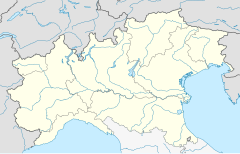Savona railway station
|
Savona
|
|
|---|---|

Savona railway station.
|
|
| Location | Piazza Aldo Moro 17100 Savona SV Savona, Savona, Liguria Italy |
| Coordinates | 44°18′25″N 08°28′13″E / 44.30694°N 8.47028°ECoordinates: 44°18′25″N 08°28′13″E / 44.30694°N 8.47028°E |
| Operated by |
Rete Ferroviaria Italiana Centostazioni |
| Line(s) |
Genoa–Ventimiglia Turin–Fossano–Savona |
| Distance | 39.10 km (24.30 mi) from Genova Piazza Principe |
| Train operators | Trenitalia |
| Construction | |
| Architect | Pier Luigi Nervi |
| Other information | |
| Classification | Gold |
| History | |
| Opened | 1977 |
| Location | |
Savona railway station (Italian: Stazione di Savona) serves the seaport and comune of Savona, in the Liguria region, northwestern Italy. Opened in 1977, it forms part of the Genoa–Ventimiglia railway, and is situated just over one quarter of the way from Genoa towards Ventimiglia. It is also the western terminus of the Turin–Fossano–Savona railway.
The station is currently managed by Rete Ferroviaria Italiana (RFI). However, the commercial area of the passenger building is managed by Centostazioni. Train services to and from the station are operated by Trenitalia. Each of these companies is a subsidiary of Ferrovie dello Stato (FS), Italy's state-owned rail company.
The station is located in the Mongrifone district of Savona, at Piazza Aldo Moro.
The present Savona railway station was built between 1959 and 1962 by architect Pier Luigi Nervi, to replace the older and more centrally located Savona Letimbro railway station. Its construction anticipated the then future doubling of the Genoa-Ventimiglia railway, which at that time followed a single-track path located mainly near the sea. The new double track line was planned to be further inland.
The completed station was officially opened in 1962, in the presence of President Antonio Segni. However, due to major construction delays the new double track line between Savona and Finale Ligure was not completed until 1977. Thus, for fifteen years the new station was a white elephant, used only occasionally by test trains operated to stabilize the embankment. Meanwhile, scheduled passenger trains continued to stop at the nineteenth century Letimbro station.
...
Wikipedia

